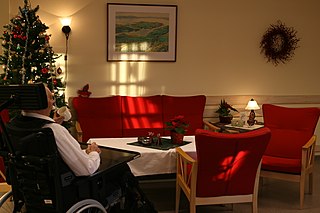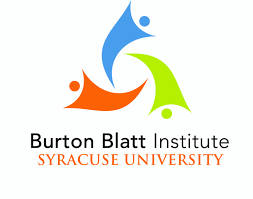Supportive housing is a combination of housing and services intended as a cost-effective way to help people live more stable, productive lives, and is an active "community services and funding" stream across the United States. It was developed by different professional academics and US governmental departments that supported housing. Supportive housing is widely believed to work well for those who face the most complex challenges—individuals and families confronted with homelessness and who also have very low incomes and/or serious, persistent issues that may include substance use disorders, mental health, HIV/AIDS, chronic illness, diverse disabilities or other serious challenges to stable housing.
Developmental disability is a diverse group of chronic conditions that are due to mental or physical impairments that arise before adulthood. Developmental disabilities cause individuals living with them many difficulties in certain areas of life, especially in "language, mobility, learning, self-help, and independent living". Developmental disabilities can be detected early on and persist throughout an individual's lifespan. Developmental disability that affects all areas of a child's development is sometimes referred to as global developmental delay.

The Rehabilitation Act of 1973,, is a federal law, codified as 29 U.S.C. § 701 et seq. The principal sponsor of the bill was Rep. John Brademas [IN-3]. The Rehabilitation Act of 1973 replaces preexisting laws to extend and revise the authorization of grants to States for vocational rehabilitation services, with special emphasis on services to those with the most severe disabilities, to expand special Federal responsibilities and research and training programs with respect to individuals with disabilities, to establish special responsibilities in the Secretary of Health, Education, and Welfare for coordination of all programs with respect to individuals with disabilities within the Department of Health, Education, and Welfare, and for other purposes.

Long-term care (LTC) is a variety of services which help meet both the medical and non-medical needs of people with a chronic illness or disability who cannot care for themselves for long periods. Long term care is focused on individualized and coordinated services that promote independence, maximize patients' quality of life, and meet patients' needs over a period of time.
Person-centred planning (PCP) is a set of approaches designed to assist an individual to plan their life and supports. It is most often used for life planning with people with learning and developmental disabilities, though recently it has been advocated as a method of planning personalised support with many other sections of society who find themselves disempowered by traditional methods of service delivery, including children, people with physical disabilities, people with mental health issues and older people. PCP is accepted as evidence based practice in many countries throughout the world.
"The normalization principle means making available to all people with disabilities patterns of life and conditions of everyday living which are as close as possible to the regular circumstances and ways of life or society." Normalization is a rigorous theory of human services that can be applied to disability services. Normalization theory arose in the early 1970s, towards the end of the institutionalisation period in the US; it is one of the strongest and long lasting integration theories for people with severe disabilities.

Deinstitutionalisation is the process of replacing long-stay psychiatric hospitals with less isolated community mental health services for those diagnosed with a mental disorder or developmental disability. In the late 20th century, it led to the closure of many psychiatric hospitals, as patients were increasingly cared for at home, in halfway houses and clinics, in regular hospitals, or not at all.
Supported living or supportive living refers to a range of services and community living arrangements (CLAs) designed with individuals with disabilities and their families to support disabled citizens to attain or retain their independence or interdependence in their local communities. Supported living is recorded in the history of the NASDDDS, celebrating its 50th Anniversary. Community Supported Living Arrangements (CSLA) was a landmark federal multi-state demonstration to illustrate the federal role in community living in the US. Supported living is considered a core service or program of community living programs funded through federal-state-local partnerships.
Direct Support Professionals (DSPs) are people who work directly with people with physical disabilities and/or intellectual disabilities with the aim of assisting the individual to become integrated into his/her community or the least restrictive environment.

The Burton Blatt Institute (BBI), established at Syracuse University in 2005, is an organization that aims to advance civic, economic, and social participation of persons with disabilities in a global society.
A group home is a residence model of medical care for those with complex health needs. Traditionally, the model has been used for children or young people who cannot live with their families or afford their own homes, people with chronic disabilities who may be adults or seniors, or people with dementia and related aged illnesses. Typically, there are no more than six residents, and there is at least one trained caregiver there 24 hours a day. In some early "model programs", a house manager, night manager, weekend activity coordinator, and four part-time skill teachers were reported. Originally, the term group home referred to homes of 8 to 16 individuals, which was a state-mandated size during deinstitutionalization. Residential nursing facilities, also included in this article, may be as large in 2015 as 100 individuals, which is no longer the case in fields such as intellectual and developmental disabilities. Depending on the severity of the condition requiring one to need to live in a group home, some clients are able to attend day programs and most clients are able to live normal lifestyles.
Psychiatric rehabilitation, also known as psych social rehabilitation, and sometimes simplified to psych rehab by providers, is the process of restoration of community functioning and well-being of an individual diagnosed in mental health or emotional disorder and who may be considered to have a psychiatric disability.
Supported employment refers to service provisions wherein people with disabilities, including intellectual disabilities, mental health, and traumatic brain injury, among others, are assisted with obtaining and maintaining employment. Supported employment is considered to be one form of employment in which wages are expected, together with benefits from an employer in a competitive workplace, though some versions refer to disability agency paid employment. Companies such as Skilcraft in the United States are an example of "supported employment" which is defined in law for state and federal reimbursements.

Intellectual disability (ID), also known as general learning disability and formerly mental retardation (MR), is a generalized neurodevelopmental disorder characterized by significantly impaired intellectual and adaptive functioning. It is defined by an IQ under 70, in addition to deficits in two or more adaptive behaviors that affect everyday, general living. Intellectual functions are defined under DSM-V as reasoning, problem‑solving, planning, abstract thinking, judgment, academic learning, and learning from instruction and experience, and practical understanding confirmed by both clinical assessment and standardized tests. Adaptive behavior is defined in terms of conceptual, social, and practical skills involving tasks performed by people in their everyday lives.
Undercliff State Hospital was a roughly 40-acre (16 ha) hospital situated on Undercliff Road, Meriden, Connecticut. It operated from 1910 to 1976. The hospital was first built under the name Meriden Sanatorium to serve children with tuberculosis, German measles, chickenpox, and smallpox, but began to accept adult patients in 1939. In the early 1920s, the site name was changed to Undercliff Sanatorium. In 1967, it was changed once again to Undercliff Mental Health Center.
Intermediate Care Facilities for Individuals with Intellectual Disabilities (ICF/IID - formerly known as Intermediate Care Facilities for Mental Retardation is an American Medicaid-funded institutional long-term support and service for people with intellectual disabilities or related conditions. Section 1905 of the Social Security Act enacted benefits and made funding available for "institutions" for individuals with intellectual or related conditions. According to federal law 42 CFR § 440.150 the purpose of ICD/IIDs is to "furnish health or rehabilitative services to persons with Intellectual Disability or persons with related conditions."
Community integration, while diversely defined, is a term encompassing the full participation of all people in community life. It has specifically referred to the integration of people with disabilities into US society from the local to the national level, and for decades was a defining agenda in countries such as Great Britain.
Family support is the support of families with a member with a disability, which may include a child, an adult or even the parent in the family. In the United States, family support includes "unpaid" or "informal" support by neighbors, families and friends, "paid services" through specialist agencies providing an array of services termed "family support services", school or parent services for special needs such as respite care, specialized child care or peer companions, or cash subsidies, tax deductions or other financial subsidies. Family support has been extended to different population groups in the US and worldwide. Family support services is currently a "community services and funding" stream in New York and the US which has had variable "application" based on disability group, administrating agency, and even, regulatory and legislative intent.
As of 2017, approximately 1.4 million Americans live in a nursing home, two-thirds of whom rely on Medicaid to pay for their care. Residential nursing facilities receive Medicaid federal funding and approvals through a state health department. These facilities may be overseen by various types of state agency.
A Qualified Intellectual Disability Professional, often referred to as a QIDP for short is a professional staff working with people in community homes who have intellectual and developmental disabilities and was previously known as a Qualified Mental Retardation Professional or QMRP. The change in terminology was implemented after the Centers for Medicaid and Medicare Services (CMS) modified the State Operations Manual Appendix J - Guidance to Surveyors: Intermediate Care Facilities for Individuals with Intellectual Disabilities The changes were implemented after President Obama signed Rosa's Law.





